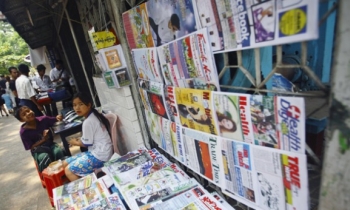Australia's newspapers, radio and TV stations are set for a major shake-up that critics warn will reduce diversity and make more viewers pay for sport, Australian Associated Press (AAP) has reported. Communications Minister Helen Coonan used a speech in Sydney Tuesday to outline the federal government's planned changes to media laws and its vision for the new digital media era.

Under the present rules, foreign companies cannot own more than 15 per cent of a television company or 25 per cent of a newspaper firm. There also is a limit of 15 per cent on the amount of TV, radio and print holdings one company can own in a single city. The government said consumers' needs had changed and reform was needed to stop Australia from becoming a "dinosaur".
Australia's Prime Minister John Howard has been hampered in his efforts to change the media law because his conservative coalition does not control the upper house of parliament, the Senate, BBC said. However, the government now controls both houses of federal parliament, increasing its chances of getting the new legislation passed.
Under the plan, existing rules banning a company from owning more than one type of medium in the same capital city or regional area would be abolished. New restrictions would ensure there are at least five commercial media groups in major cities, and four in regional centres. The list of sports offered first to free-to-air networks is also under review, with pay TV networks given a better chance of taking up broadcast rights.
Limits on foreign ownership of the media would be lifted and power handed to the treasurer to determine whether it is in Australia's best interest. Analogue television services will be switched off by 2012 and replaced by digital TV. After that, viewers will need digital TV sets or digital receivers, also known as set-top boxes.
The government also plans to ease limits on cross-media ownership that prevent investors owning television stations and newspaper operations in the same city. This will give powerful groups such as Rupert Murdoch's News Limited and the Packers' Publishing and Broadcasting Ltd the opportunity to consolidate further their positions in the sector, Financial Times said. Until now, foreign investors have been restricted to stakes of up to 25 per cent. They will still require approval from the Foreign Investment Review Board, which examines all substantial overseas investments in Australia.
"The paper (Meeting the Digital Challenge: Reforming Australia's Media in the Digital Age) encourages a rationalisation of media players by provoking merger activity. The last time that happened in Australia, the result was debt-laden companies, many of which subsequently ended up in receivership," pointed out Aidan White, International Federation of Journalists (IFJ) General Secretary.

Coonan, however, had said that the changes were an "evolution" and necessary for the media industry to move forward. "For the government, the impact of digital technology means the current regulatory settings, which are largely designed for an analogue world, risk becoming outdated," the minister maintained.
"These reform options marry the government's longstanding policy of changes to cross media laws in Australia and relaxation of the foreign ownership restrictions with reforms to ensure Australia will not be left behind as the world converts to digital. There is a compelling case for change and if the government does not act then there is a genuine risk that Australia will become a dinosaur of the analogue age," she said.
There are fears that the new rules may spark a rash of buyouts by big players in markets such as Sydney and Melbourne, halving the number of media owners and reducing diversity of views. "The existing media barons will have greater ownership, greater control over the diversity of opinion in this country," Opposition communications spokesman Stephen Conroy said.
IFJ, on the other hand, argued that there has already been a dramatic collapse of local content and production in Australian media. The government paper proposes to further deny Australian audiences their own cultural identity and information from their own news organisations by reducing media diversity and encouraging foreign ownership.
"The discussion paper aims to treat media assets like any other business: subject to the same competition rules and foreign investment policies," said White. "But media assets are a vital pillar of the democratic process and, as such, play a crucial role of informing the community and that role must be not be undermined by a decline in media diversity and an increase in foreign owners."
IFJ felt the paper should recognise that the transition to digital provides mechanisms to increase diversity and local content. But instead, the government paper has missed the many opportunities that digital technology provides.

Coonan contended that existing limits on broadcasting licences would be retained, and regional stations would still be required to provide minimum levels of local content. Under changes to start in January next year, a "use it or lose it" scheme kicks in for the sports on the so-called anti-siphoning list.
"This is an important step forward in consideration of media law and reform, and we commend the minister on her initiative," said John Fairfax, publisher of the Australian Financial Review, the dominant business daily, the Sydney Morning Herald and the Melbourne Age, the country's leading broadsheets. Analysts said Fairfax, which has been shielded from predators by the existing regulations, could be central to the consolidation the reforms are expected to unleash, Financial Times reported.
The changes will mean that if free-to-air networks do not show an interest in acquiring the rights of events on the list, they will be removed from the list, permanently depriving free-to-air networks of the right to make the first bid on them. New media players would also be able to bid for two new digital licences to deliver services such as pay TV or video to next-generation mobile phones.
Existing free-to-air TV networks would be protected by a ban on the entry of a fourth commercial network. ABC and SBS will be able to multi-channel in the near future, while commercial networks would have to wait for at least four years.
The Australian Consumers Association's Gordon Renouf said that despite the new digital services, and giving the two national broadcasters a chance to multi-channel, there was little in the plan to lure consumers to digital. Renouf said the main media players already dominated the new media market.
"While the internet and 3G mobile services mean that consumers do have access to more sources of content, in fact most of the top 10 internet sites are owned or associated with the major media players delivering the same or similar content by a different medium," he said.
The government is seeking comment on its plan till April 18.









